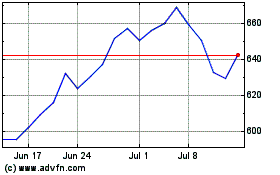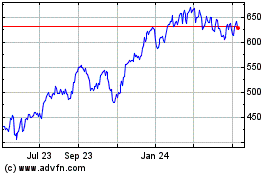By Peter Rudegeair and Laura Saunders
The tax-preparation business isn't really about taxes anymore.
It's about charging millions of Americans little or nothing for tax
preparation as a way to get at their other information.
Intuit Inc., maker of the popular TurboTax products, this year
offered free preparation to millions of Americans with simple
returns, and H&R Block Inc. countered with a more-generous
offer. Both companies hoped new customers would pay for add-ons to
their returns, or prove to be "sticky" and pay fees some day.
Meanwhile, personal-finance portal Credit Karma Inc. is charging
consumers nothing at all for its tax-prep service.
Alabama Revenue Commissioner Julie Magee is among those who
welcome Credit Karma's offer. She believes people shouldn't have to
pay to do their taxes, and she recently helped her 26-year-old
daughter file her taxes using Credit Karma's new service.
"It was easy, totally free, and very secure," said Ms. Magee,
adding that Credit Karma's "interview process looks and feels like
the software people pay for."
Behind the wave of free offers is a significant trend: More
Americans than ever are comfortable filing their taxes online. This
development has made TurboTax a household name, but it now
threatens margins across the industry. Notably, the average fee
this year for returns prepared in H&R Block's own offices is
$217, while its current online fee for many filers is $94.
As a result, tax-preparation firms need more than taxes to
ensure their future. Some are using tax filers' information to
recommend credit cards and loans; others see profits in using data
to suggest financial strategies based on tax returns.
"The winner is the taxpayer, and the loser is everyone who can't
monetize [their customers]," said Brad Smith, Intuit chief
executive.
As millions of Americans hand over some of their most private
data to corporate middlemen, though, there are risks for both
privacy and security. Credit Karma, on its consent form this year,
told tax filers it can use their 2016 return data through 2025.
As the amount of online tax data grows, so does its allure as a
target for criminals who want to steal and use it. This spring,
hacking forced a government website to shut down an online tool
that college students seeking financial aid used to link to family
tax filings. The Internal Revenue Service and industry have
undertaken security upgrades, including efforts that cut new
complaints of tax identity theft in half last year.
Among current players, Credit Karma has the most aggressive
vision of tax-prep's future. The company, founded in 2007 and
recently valued at $3.5 billion, grew by providing free credit
scores and reports to borrowers who previously often paid about $80
to get them with other services.
Credit Karma now earns hundreds of millions of dollars a year in
fees from credit-card firms and other lenders, who place products
with its 60 million consumers. To extend its reach, CEO Kenneth Lin
bought AFJC Corp., an online tax-prep provider, for an undisclosed
sum last year.
Credit Karma says it encourages, but doesn't require, users of
the free tax preparation to share their tax data so the company can
match them with lenders. "Today, virtually no one charges for the
credit score," said Mr. Lin. "We're excited that we might have a
similar impact" on tax filing.
Paid professionals signed nearly 82 million individual returns
for 2014, about the same as for 2008, according to the latest data
available from the Internal Revenue Service. Meanwhile,
self-prepared e-filed returns increased nearly 60%, to 50
million.
TurboTax deserves much of the credit for that surge. Last year,
Americans used Intuit's software to file more than a quarter of all
individual returns. To maintain and extend its dominance, Intuit is
piloting a service for TurboTax users through a partnership with
student-loan provider Earnest Inc.
If taxpayers consent, Intuit runs their data through Earnest's
algorithms, which also pull borrowing and payment histories from
credit bureaus. Earnest will then determine how much it can save
users on their loans and make offers on the spot.
In exchange for access to Intuit's estimated 5 million TurboTax
customers with student debt, Earnest will pay Intuit a referral fee
based on the loans it closes. Intuit is considering expanding such
sharing to firms offering mortgages and credit cards, among other
financial products.
"All of them need distribution... and everyone's got to pay
their taxes, " says Varun Krishna, the Intuit executive who heads
the project.
H&R Block, the oldest national tax-prep firm, also made a
free tax-filing offer. But unlike Intuit and Credit Karma, H&R
Block has an urgent need to drive foot traffic into 10,500
locations operated by the company and its franchisees. These
outposts contribute nearly $9 out of every $10 Block earns in
tax-prep fees.
H&R Block was founded in 1955 by brothers Henry and Richard
Bloch, who charged people $5 to prepare their taxes in a Kansas
City, Mo., storefront. In recent years, the company hasn't been as
successful with do-it-yourself offerings as TurboTax has been. Last
year a 6% drop in tax returns prompted the company to lay off 13%
of its workers.
H&R Block has teamed up with IBM's Watson computer system to
offer tax-wise financial strategies at no extra charge to taxpayers
using its preparers.
Starting this year, every Block tax preparer's desk has two
computer screens -- one for the preparer, and one for the customer
following along. The Watson system, based on the taxpayer's
specific data, offers suggestions -- such as reducing withholding,
buying a home or saving more in a company retirement plan. As
Watson gains experience, its recommendations are expected to become
more sophisticated, and H&R Block hopes they will help get and
keep customers.
To publicize the efforts, Block has mounted an ad blitz with the
tagline "Get your taxes won," including a 2017 Super Bowl
commercial starring "Mad Men" actor Jon Hamm.
Block, too, is bidding for customers by offering some filers
fee-free, interest-free loans of up to $1,250 against tax refunds.
Block is willing to absorb the cost of the loans, typically around
$35, in order to attract new customers. Last month, the company
said it has approved more than 855,000 refund-advance loans worth
some $700 million.
"H&R Block is trying to use every arrow in its quiver," says
Jeff Silber, an analyst at BMO Capital Markets.
Write to Peter Rudegeair at Peter.Rudegeair@wsj.com and Laura
Saunders at laura.saunders@wsj.com
(END) Dow Jones Newswires
April 07, 2017 05:44 ET (09:44 GMT)
Copyright (c) 2017 Dow Jones & Company, Inc.
Intuit (NASDAQ:INTU)
Historical Stock Chart
From Mar 2024 to Apr 2024

Intuit (NASDAQ:INTU)
Historical Stock Chart
From Apr 2023 to Apr 2024
